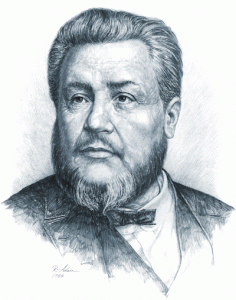 “To say that “a creed comes between a man and his God” is to suppose that which is not true; for truth, however definitely stated, that which I believe I am not ashamed to state in the plainest possible language; and the truth I hold I embrace because I believe it to be the mind of God revealed in his infallible Word. How can it divide me from God who revealed it? It is one means of my communion with my Lord, that I receive his words as well as himself, and submit my understanding to what I see to be taught by him. Say what he may, I accept it because he says it, and therein pay him the humble worship of my inmost soul.
“To say that “a creed comes between a man and his God” is to suppose that which is not true; for truth, however definitely stated, that which I believe I am not ashamed to state in the plainest possible language; and the truth I hold I embrace because I believe it to be the mind of God revealed in his infallible Word. How can it divide me from God who revealed it? It is one means of my communion with my Lord, that I receive his words as well as himself, and submit my understanding to what I see to be taught by him. Say what he may, I accept it because he says it, and therein pay him the humble worship of my inmost soul.
I am unable to sympathize with a man who says he has no creed; because I believe him to be in the wrong by his own showing. He ought to have a creed. What is equally certain, he has a creed—he must have one, even though he repudiates the notion. His very unbelief is, in a sense, a creed.” – C. H. Spurgeon, from an article titled “The Baptist Union Censure,” published as an introduction to the 1888 volume of The Metropolitan Tabernacle Pulpit sermons
 “Doctrine divides!” That’s the popular belief of our culture today, as its sails on the shifting sea of modern day relativism. Our generation shouts out, “It doesn’t matter what you believe, as long as you are sincere,” yet the Bible portrays a very different message.
“Doctrine divides!” That’s the popular belief of our culture today, as its sails on the shifting sea of modern day relativism. Our generation shouts out, “It doesn’t matter what you believe, as long as you are sincere,” yet the Bible portrays a very different message.
We have to admit that doctrine does in fact divide. It divides truth from error, the true prophet from the false prophet, and the real Christ from the counterfeit.
In another sense though, doctrine unites. It allows those who hold to the truth of Scripture to come together under the banner of that truth.
In this ocean of change, there stands a bedrock that has stood the test of time. It is an ancient creed that offers a sure and safe haven, and is an anchor in a theological world adrift and deceived. Christians throughout the centuries have built their lives on it, believing that its statements are merely reflections of what the Bible teaches about God, His Son, Jesus Christ, and the life the Holy Spirit brings to His Church.
The Apostles’ Creed portrays the very heart of the Christian faith the core teachings that are dispensed with only at great peril to the soul. It is the theological and orthodox “bottom line” concerning what we as Christians believe, and it dates from very early times in the Church, a half century or so from the last writings of the New Testament.
THE APOSTLES’ CREED
I believe in God, the Father Almighty, the Creator of heaven and earth and in Jesus Christ, His only Son, our Lord:
Who was conceived of the Holy Spirit, born of the Virgin Mary, suffered under Pontius Pilate, was crucified, died, and was buried.
He descended into hell.
The third day He arose again from the dead.
He ascended into heaven and sits at the right hand of God the Father Almighty, whence He shall come to judge the living and the dead.
I believe in the Holy Spirit, the holy *catholic church, the communion of saints, the forgiveness of sins, the resurrection of the body, and life everlasting. Amen.
* The word “catholic” refers not so much to the Roman Catholic Church, but to the universal church of the Lord Jesus Christ.
In a similar way, the Nicene creed has helped even further to define what the Scriptures teach.
THE NICENE CREED
I believe in one God, the Father Almighty, Maker of heaven and earth, and of all things visible and invisible.
And in one Lord Jesus Christ, the only-begotten Son of God, begotten of the Father before all worlds; God of God, Light of Light, very God of very God; begotten, not made, being of one substance with the Father, by whom all things were made.
Who, for us men for our salvation, came down from heaven, and was incarnate by the Holy Spirit of the virgin Mary, and was made man; and was crucified also for us under Pontius Pilate; He suffered and was buried; and the third day He rose again, according to the Scriptures; and ascended into heaven, and sits on the right hand of the Father; and He shall come again, with glory, to judge the quick and the dead; whose kingdom shall have no end.
And I believe in the Holy Ghost, the Lord and Giver of Life; who proceeds from the Father and the Son; who with the Father and the Son together is worshipped and glorified; who spoke by the prophets.
And I believe one holy catholic and apostolic Church. I acknowledge one baptism for the remission of sins; and I look for the resurrection of the dead, and the life of the world to come. Amen.
Then a third creed, known as the Athanasian creed, named after Athanasias, was developed as a standard for Christian belief. Continue reading

 THE CAMBRIDGE DECLARATION of the Alliance of Confessing Evangelicals – April 20, 1996
THE CAMBRIDGE DECLARATION of the Alliance of Confessing Evangelicals – April 20, 1996